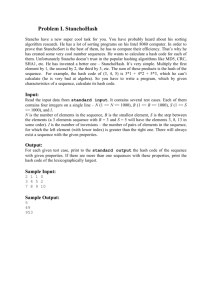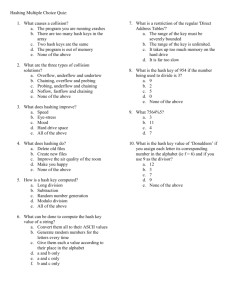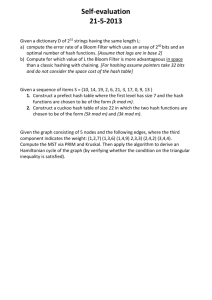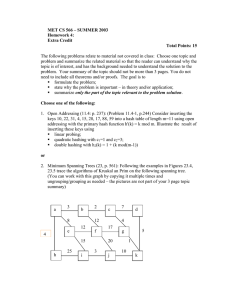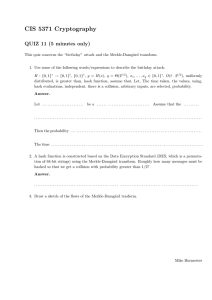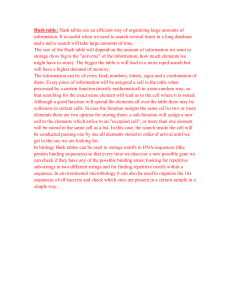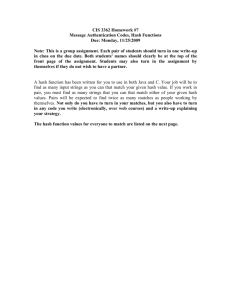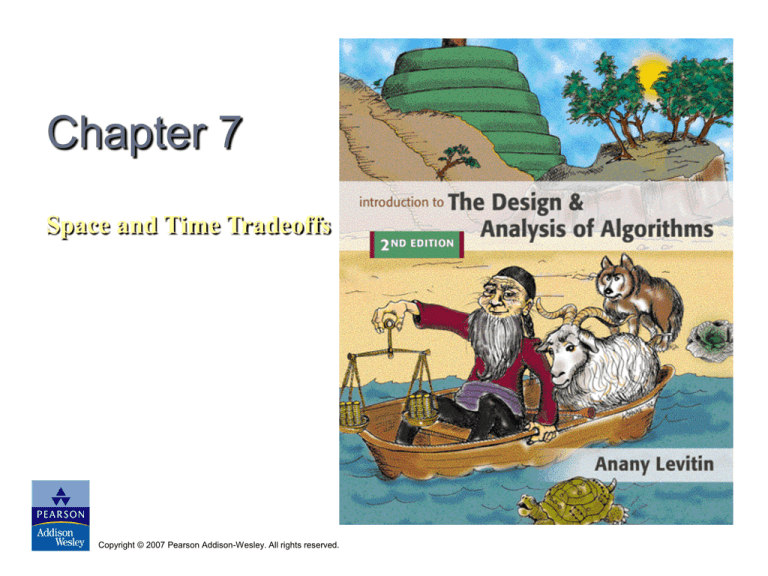
Chapter 7
Space and Time Tradeoffs
Copyright © 2007 Pearson Addison-Wesley. All rights reserved.
Space-for-time tradeoffs
Two varieties of space-for-time algorithms:
input enhancement — preprocess the input (or its
part) to store some info to be used later in solving
the problem
counting sorts (Ch. 7.1)
string searching algorithms
prestructuring — preprocess the input to make
accessing its elements easier
hashing
indexing schemes (e.g., B-trees)
Copyright © 2007 Pearson Addison-Wesley. All rights reserved.
A. Levitin “Introduction to the Design & Analysis of Algorithms,” 2nd ed., Ch. 7
7-1
Hashing
A very efficient method for implementing a
dictionary, i.e., a set with the operations:
find
insert
delete
Important applications:
symbol tables
databases (extendible hashing)
Copyright © 2007 Pearson Addison-Wesley. All rights reserved.
A. Levitin “Introduction to the Design & Analysis of Algorithms,” 2nd ed., Ch. 7
7-2
Hash tables and hash functions
The idea of hashing is to map keys of a given file of size n
into a table of size m, called the hash table, by using a
predefined
function, called the hash function,
h: K location (cell) in the hash table
Example: student records, key = SSN. Hash function:
h(K) = K mod m where m is some integer (typically,
prime)
If m = 1000, where is record with SSN= 314159265
stored?
Generally, a hash function should:
be
easy to compute
distribute keys about evenly throughout the hash table
Copyright © 2007 Pearson Addison-Wesley. All rights reserved.
A. Levitin “Introduction to the Design & Analysis of Algorithms,” 2nd ed., Ch. 7
7-3
Collisions
If h(K1) = h(K2), there is a collision
Good hash functions result in fewer collisions but some
collisions should be expected (birthday paradox)
Copyright © 2007 Pearson Addison-Wesley. All rights reserved.
A. Levitin “Introduction to the Design & Analysis of Algorithms,” 2nd ed., Ch. 7
7-4
Open hashing (Separate chaining)
Keys are stored in linked lists outside a hash table whose
elements serve as the lists’ headers.
Example: A, FOOL, AND, HIS, MONEY, ARE, SOON, PARTED
h(K) = sum of K’s letters’ positions in the alphabet MOD 13
Key
A
h(K)
1
0
1
FOOL AND HIS
9
2
6
3
4
A
10
5
6
MONEY
ARE
SOON
PARTED
7
11
11
12
7
8
AND MONEY
9
10
11
12
FOOL HIS ARE PARTED
SOON
Search for KID
Copyright © 2007 Pearson Addison-Wesley. All rights reserved.
A. Levitin “Introduction to the Design & Analysis of Algorithms,” 2nd ed., Ch. 7
7-5
Example :For the input 30, 20, 56, 75, 31, 19 and hash function
h(K) = K mod 11 , construct the hash table with linked lists .
index 0
key
1
2
3
4
5
6
7
8
9
10

